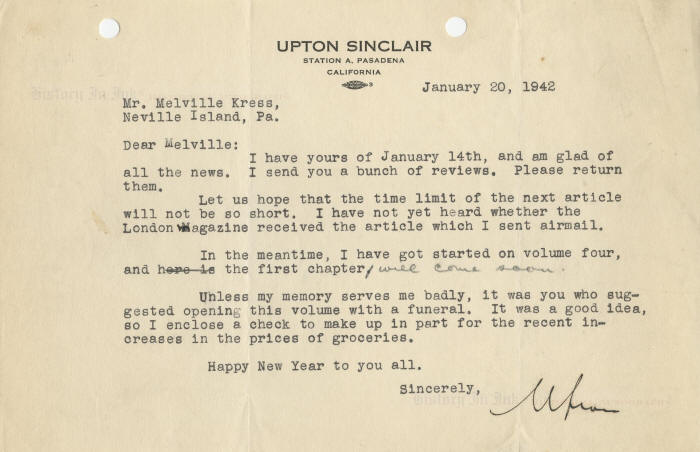1432701
Upton Sinclair
Scroll down to see images of the item below the description
Sinclair thanks a critic for suggesting the opening chapter
of his fourth Lanny Budd novel, Wide is the Gate
Upton Beall Sinclair, Jr., 1878–1968. American author; winner of the Pulitzer Prize. Excellent content Typed Letter Signed, Upton, one page, 8½" x 5½", on imprinted personal stationery, Pasadena, California, January 20, 1942.
Sinclair sends reviews of his work and a gift—a check—to literary critic Melville Kress to thank him for suggesting the opening chapter of his fourth Lanny Budd novel, Wide is the Gate, which he had just begun writing. In full: “I have yours of January 14th, and am glad of all the news. I send you a bunch of reviews. Please return them. / Let us hope that the time limit of the next article will not be so short. I have not yet heard whether the London magazine received the article which I sent airmail. / In the meantime, I have got started on volume four, and the first chapter will come soon. / Unless my memory serves me badly, it was you who suggested opening this volume with a funeral. It was a good idea, so I enclose a check to make up in part for the recent increases in the prices of groceries. / Happy New Year to you all."
The Lanny Budd novels spotlighted a central fictional character, Lanny Budd, throughout a series of 11 books that Sinclair published between 1940 and 1953. Budd was a sophisticated socialite, the son of an American arms manufacturer, whom Sinclair placed in the context of important political events in the United States and Europe.
Wide is the Gate (1943), the fourth novel in the series, followed the Pulitzer Prize-winning Dragonʼs Teeth (1942). It covers the period of 1934–1937. In it, Budd becomes a secret double agent supporting the German resistance against the Nazis. As Sinclair notes in this letter, Chapter 1, entitled “Dust to Dust,” opens the novel with a funeral.
Sinclair originally gained fame as a muckraking writer with his 1906 book The Jungle, which exposed conditions in the American meat packing industry and led to enactment of the Pure Food and Drug Act and the Meat Inspection Act. In 1919, he published an expose of American yellow journalism entitled The Brass Check. An outspoken socialist who ran unsuccessfully for both Congress and Governor of California, Sinclair was, Time magazine said, "a man with every gift except humor and silence."
Sinclair dedicated Wide is the Gate to "my millions of friends in the Soviet Union, who, while this book was being written, have been defending our common cause." By 1942, although they suffered huge losses in both troops and military materiel, the Soviets had survived Germanyʼs invasion in Operation Barbarossa, which lasted from June–December 1941.
Kress (1906–1998), to whom Sinclair wrote this letter, became interested in Sinclairʼs work during the 1920s and corresponded with him regularly. When Sinclair began the Lanny Budd series, he asked Kress to review the chapters as he completed them. This letter is one of many that Sinclair and Kress exchanged as the series progressed. Kress began a biography of Sinclair, entitled Mightier Than the Sword: The Era of Upton Beall Sinclair, in the late 1930s.
Sinclair has signed this letter in black fountain pen and has made handwritten emendations, one in pen and another in pencil. The letter has two vertical mailing folds, one of which touches the upstroke in the “U" in Sinclair's signature. There are filing holes in the top blank margin, a couple of wrinkles in the upper right corner, and a bit of soiling. Overall the letter is in fine condition.
Unframed. Please ask us about custom framing this piece.
Click here to see more American authorsʼ and American History autographs.
$250.00







